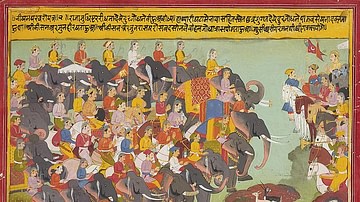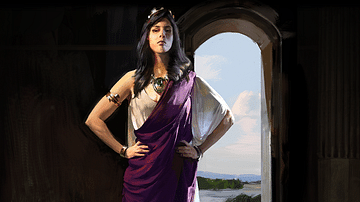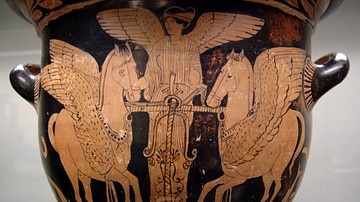Search
Did you mean: Muse?
Search Results

Definition
Crucifixion
Crucifixion as a punishment was practiced by several ancient cultures, but most notably adopted by the Roman Republic and later Roman Empire. Crucifixion was a method of hanging or suspending someone on the combination of vertical and horizontal...

Definition
Third Punic War
The Third Punic War was fought between Carthage and Rome between 149 and 146 BCE. Carthage had already lost two wars against Rome, but their assault on their Numidian neighbours gave the Romans the perfect excuse to crush this troublesome...

Definition
Ten Commandments
The Ten Commandments introduce the legislation received by Moses on Mt. Sinai after the Israelites escaped from Egypt (as related in the biblical book of Exodus). The "ten commandments" is often used as shorthand for the basic rules that...

Definition
Kauravas
The Kauravas are the 100 sons of the King of Hastinapur, Dhritarashtra, and his wife Gandhari who played a significant role in the legendary Indian epic, the Mahabharata. Hastinapur is assumed to be the current modern state of Haryana, and...

Definition
Eris
Eris is the Greek goddess and personification of discord and strife. She is an unpopular figure in Greek mythology due to her problematic behaviour and her ability to stir up trouble wherever she goes. Eris is most famous for her Golden Apple...

Definition
Dido - Legendary Queen of Tyre
Queen Dido (aka Elissa, from Elisha, or Alashiya, her Phoenician name) was a legendary Queen of Tyre in Phoenicia who was forced to flee the city with a loyal band of followers. Sailing west across the Mediterranean she founded the city of...

Definition
Labyrinth
The word labyrinth comes from the Greek labyrinthos and describes any maze-like structure with a single path through it which differentiates it from an actual maze which may have multiple paths intricately linked. Etymologically the word...

Definition
Ghosts in the Ancient World
A belief in an afterlife was central to every major civilization of the ancient world and this encouraged the recognition of the reality of ghosts as the spirits of the departed who, for one reason or another, either returned from the realm...

Definition
Apsaras and Gandharvas
In the Vedas, the apsaras are water nymphs, often married to the gandharvas. By the time the Puranas and the two epics were composed, the apsaras and gandharvas had become performing artists to the gods; the apsaras are singers, dancers...

Definition
Eos
Eos is the personification and goddess of the dawn in Greek mythology. She is the daughter of the Titans Hyperion and Theia and the sister of Helios (Sun) and Selene (Moon). Dressed in a saffron-coloured mantle, Eos rides on her chariot in...